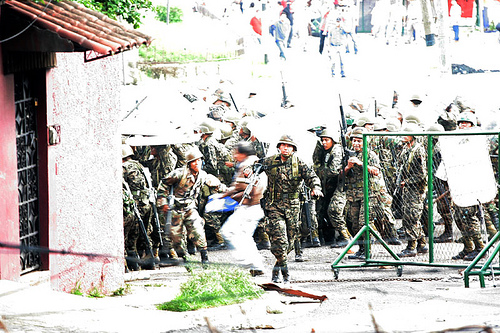
Photo by rbreve on Flickr (June 29): this was a very scary moment, military was firing their guns, I had to run…
Contents
Background
The June 28 arrest and expulsion of Honduran President José Manuel “Mel” Zelaya by the country's armed forces has caused deep rifts between Hondurans on whether his removal should be considered a military coup or not. Roberto Micheletti, the speaker of parliament, was sworn into power by congress the same day the military flew Zelaya to Costa Rica in his pajamas.
The conflict stems from an attempt by the Zelaya to hold a public consultation about a constitutional reform that would make it possible for him to run for president once more, disregarding current term limits. The consultation was determined to be illegal by the Honduras supreme court and congress. Additionally, Zelaya has been under scrutiny from other members of congress and the public for his friendships with Hugo Chavez in Venezuela and the Castro government in Cuba.
Many remain loyal to Manuel Zelaya and/or strongly disagree with his forced and sudden removal. Meanwhile, there are also Hondurans who refuse to call the events “a coup” because the military were enforcing a ruling from the supreme court, as well as a vote from congress indicating that Zelaya committed “repeated violations of the constitution and the law.” Protests representing both sides have taken to the streets of Honduran cities, and the crisis remains unresolved.
Many countries have condemned the action, and some have recalled their ambassadors in Tegucigalpa. The Organization of American States has suspended Honduras’ membership.
Global Voices posts
07 Jul – Honduras: Videos attempt to explain political situation
04 Jul – Honduras: Was it a Coup?
29 Jun – Honduras: Zelaya Arrested and Removed as President
27 Jun – Honduras: Political Crisis Over Controversial Referendum
You can also follow our coverage in Spanish on Global Voices en Español.
Analysis
- Ethan Zuckerman, My heart's in Accra: Activist media and selective amplifiers
- Ismael Moreno, openDemocracy: Honduras: Behind the crisis
Videos
Some are using videos to express their perspectives, and we bring you a few of them.
This first video in English, widely distributed through the microblogging site Twitter, presents an explanation of why the recent events shouldn't be called a coup:
[broken video removed]
This next video, shows the opposite view, and calls the event a coup d'état. The words in the video are translated below.
[broken video removed]
following quotes are translated from the text on their video:
Sunday June 28. The constitutional order is broken with the kidnapping and expulsion of the President of the Republic José Manuel Zelaya Rosales.
Access to information is interrupted, electric energy is suspended, telephone, internet access, all national and international news channels are blocked, they take possession of the alternative news networks.
They manipulate information through pro-coup networks.
Popular organizations, civil organizations, LGBT, students, teacher organizations, women's feminists and others defend the Rule of Law in front of the Government offices.
Men and women in the whole country defend the Rule of Law against the pro-coup members of the National Congress and Army.
In the face of repression… lets defend the Rule of Law!
Its not a change of power, ITS A COUP D'ETAT!
This next video shows some of the violent events that have followed the change in power this past June 28th in spite of the new government's statements of how the situation is currently calm.
[broken video removed]
Photos
The following photos by Flickr user rbreve in Honduras are 1) from an airport protest by people awaiting Zelaya's return from exile (he was not allowed to land), 2) from an anti-Zelaya march.
[broken video removed]
This is a widget of a live search on Twitter for Tweets using the hashtag #Honduras.
[broken widget removed]
